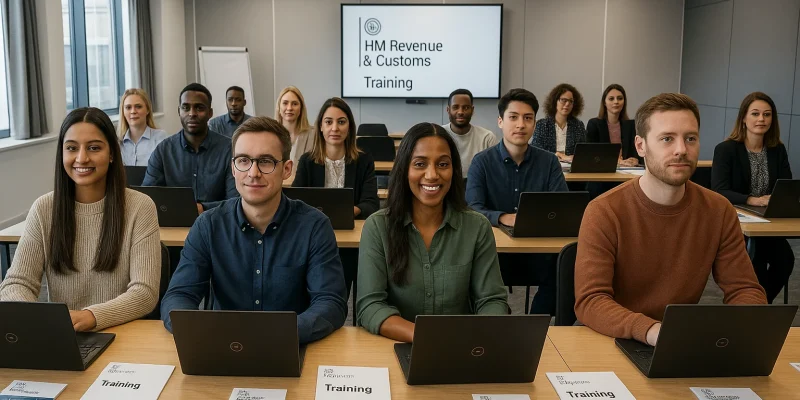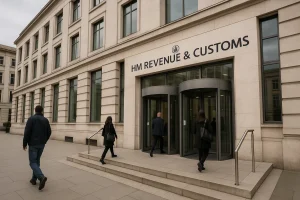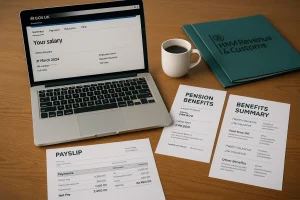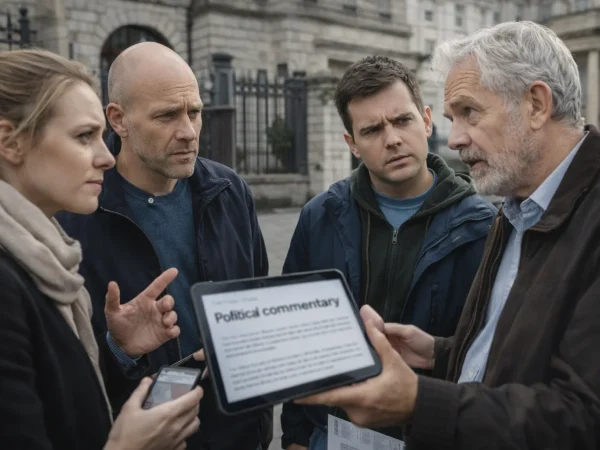
Tax Specialist Programme 2026: Eligibility, Training, and Career Path Explained
The HMRC Tax Specialist Programme 2026 is a prestigious graduate scheme designed to develop future leaders in tax compliance and enforcement within the UK Civil Service.
Offering structured training, real casework, and a clear path to senior roles, the programme is ideal for analytical thinkers committed to public service.
With applications now open, understanding the eligibility criteria, training structure, and long-term career opportunities is essential for prospective candidates aiming to join one of the UK’s most impactful government departments.
What Is The HMRC Tax Specialist Programme 2026?

The Tax Specialist Programme 2026 is a structured graduate training scheme designed by HM Revenue and Customs (HMRC) to develop the next generation of tax professionals in the United Kingdom.
It offers the opportunity to gain in-depth expertise in tax law, compliance, and public finance while contributing directly to the nation’s ability to fund essential services such as healthcare, education, and infrastructure.
Participants are employed within HMRC’s Compliance Operations Directorate (COD), working across key UK cities such as London, Manchester, Leeds, Glasgow, Birmingham, and Bristol.
The programme is aimed at individuals who demonstrate analytical thinking, integrity, and a strong sense of public service.
Trainees will handle real cases from the beginning, investigating tax compliance, identifying errors, resolving disputes, and ensuring businesses and individuals pay what they owe under UK law.
This hands-on approach allows recruits to develop professional judgment and a thorough understanding of how UK taxation works in practice.
Who Is Eligible To Apply For The Tax Specialist Programme?
Eligibility for the Tax Specialist Programme 2026 depends on educational qualifications, work status, and legal rights to work in the United Kingdom.
Academic Requirements
Applicants must have achieved or expect to achieve a 2:2 degree (or higher) in any discipline, or hold an equivalent Level 6 qualification by September 2026.
Degrees in accounting, law, economics, or business may be advantageous but are not mandatory.
Additional Eligibility Criteria
To be considered for the programme, candidates must:
- Have the right to work in the UK (Skilled Worker sponsorship is not offered)
- Pass all relevant security and background checks
- Uphold the Civil Service Code of integrity, honesty, objectivity, and impartiality
- Have no active disciplinary sanctions at the time of application
Existing Civil Servants who do not have a degree may still apply if they joined through fair and open competition and have passed their probation period.
Applicants from diverse backgrounds are encouraged to apply as part of HMRC’s commitment to inclusivity.
How Does The Application And Selection Process Work?

The selection process for the Tax Specialist Programme 2026 is multi-staged and designed to identify candidates with strong analytical and communication skills, as well as the ability to work under pressure.
It begins with an online application and progresses through a series of assessments before final offers are made.
Application Process Overview
| Stage | Assessment Type | Key Details |
| Stage 1 | Application Submission | Complete the online form and eligibility check via the Civil Service Jobs website before 23:55 on 22 October 2025 |
| Stage 2 | Online Verbal and Numerical Tests | Must be completed by 11:30 on 24 October 2025. Untimed but best completed within 48 hours |
| Stage 3 | Civil Service Judgement Test | Opens on 31 October 2025, closes 5 November 2025 |
| Stage 4 | Video Interview | Pre-recorded interview between 14 and 21 November 2025 |
| Stage 5 | Virtual Assessment Centre | Group discussions and case analysis between 9 and 27 February 2026 |
Applicants who pass the initial tests and interviews are assessed on competencies including Communicating and Influencing, Delivering at Pace, and Making Effective Decisions.
Successful candidates will receive offers based on merit within their preferred regional location.
Key Points For Applicants
- Applications must be submitted before the stated deadlines; late submissions are not accepted.
- Applicants should ensure they use a stable internet connection for all online tests.
- Results are reviewed regionally, and pass marks may be adjusted based on application volumes.
What Kind Of Training Does The Programme Provide?
The Tax Specialist Programme 2026 offers a comprehensive, multi-year training structure that equips participants with technical knowledge, professional skills, and real-world experience.
The goal is to develop highly competent tax professionals who can interpret legislation, investigate complex cases, and make decisions that impact the public interest.
Structure And Duration Of The Programme
The training typically spans three to four years, depending on individual progress and any part-time arrangements.
It is divided into phases that gradually increase in complexity, moving from foundational tax principles to high-level casework and leadership preparation.
Learning Methods And Delivery
Training is delivered using a blended approach that combines:
- Weekly virtual classroom sessions led by HMRC trainers
- In-person training workshops for collaboration and skill development
- Hands-on casework supervised by experienced tax professionals
- Individual study and guided legal research assignments
- Structured assessments and feedback sessions
This variety ensures that trainees not only understand tax legislation but also learn how to apply it practically in various business and legal scenarios.
Topics And Competencies Covered
Trainees are exposed to a wide range of tax areas and compliance challenges, such as:
- Income Tax, VAT, and Corporation Tax
- Tax avoidance and fraud investigation techniques
- HMRC policies and operational procedures
- Evidence gathering and legal interpretation
- Negotiation and dispute resolution
- Leadership, communication, and teamwork
As part of their development, participants gain familiarity with statutory instruments, financial statements, and case law to help them make sound and defensible decisions.
Role Of Mentoring And Supervision
Each trainee is assigned a mentor or line manager who provides regular guidance and evaluates performance at key checkpoints.
This support system ensures that all participants remain on track while navigating complex responsibilities and work environments.
Mentors often help trainees:
- Prioritise workloads across multiple cases
- Prepare for internal assessments
- Develop soft skills like diplomacy and professional communication
- Understand career pathways within HMRC
Commitment And Attendance Requirements
While hybrid working is permitted, the programme demands a significant level of in-person involvement. Key attendance expectations include:
- Participation in all scheduled learning activities
- Attendance at training and assessment centres
- Availability for face-to-face case discussions and stakeholder meetings
This ensures that all participants develop both theoretical and practical capabilities under consistent standards.
What Are The Salary And Benefits Of Joining HMRC As A Tax Specialist?

The Tax Specialist Programme 2026 offers competitive salaries and a comprehensive benefits package that reflects the importance of the role within the Civil Service.
Salary Overview
| Location | Starting Salary | Salary After Promotion (Grade 7) | Bonus |
| National | £37,682 – £40,705 | £58,541 | £2,500 (on successful completion) |
| London | £42,631 – £46,077 | £65,869 | £2,500 (on successful completion) |
Benefits Summary
- Pension Contribution: Employer contribution of 28.97% under the Civil Service Alpha Pension Scheme.
- Annual Leave: Starting at 25 days, increasing with service to a maximum of 30 days.
- Flexible and Hybrid Working: Up to 40% of the week can be worked remotely.
- Health and Wellbeing Support: Access to occupational health and counselling services.
- Learning and Development: Continuous professional education and leadership courses.
Employees also benefit from a strong emphasis on equality, diversity, and inclusion. HMRC’s workplace policies are designed to support people from all backgrounds and encourage a healthy work-life balance.
What Career Progression Can You Expect After Completing The Programme?
One of the defining features of the Tax Specialist Programme is the structured and automatic career progression available to those who successfully complete the training.
Graduates typically move into Grade 7 positions, taking on greater responsibility and strategic roles within HMRC.
Grade 7 Promotion And Senior Status
Upon successful completion of the programme, participants are promoted to Grade 7, a senior leadership level within the Civil Service. This promotion is not merely a title change—it includes:
- A significant salary increase
- Access to complex and high-profile casework
- The authority to make legally binding decisions
- Responsibility for managing junior staff or whole compliance teams
The Grade 7 role is widely recognised across government as a position of influence, offering opportunities to shape tax policy, lead national projects, and contribute to departmental objectives.
Specialist Career Pathways Within HMRC
Graduates can choose from a variety of career specialisms after promotion, depending on interest and operational need. These include:
- VAT Specialist: Focusing on domestic and international VAT compliance and risk
- Corporation Tax Advisor: Working with large businesses and complex group structures
- Tax Policy Analyst: Developing and reviewing national tax policies and regulations
- Investigations Officer: Leading fraud detection and enforcement projects
- Technical Advisor: Supporting legal interpretation and appeals processes
Each pathway provides further learning and progression opportunities, with support from HMRC’s ongoing development programmes.
Leadership And Management Opportunities
Many Grade 7 tax specialists progress to Grade 6 and above, where they take on executive roles with oversight across multiple teams or regions. These leadership roles include:
- Compliance Team Leader
- Regional Operations Manager
- Policy Lead in HM Treasury
- Civil Service Director Roles (with additional training)
In these positions, professionals influence major decisions on tax collection, budgetary enforcement, and national compliance initiatives.
Lateral And Cross-Departmental Moves
The Civil Service encourages internal mobility. Experienced tax specialists often transfer into other departments or roles such as:
- National Audit Office (NAO) reviewers
- Advisors to government legal teams
- Strategic roles in HM Treasury
- Consultancy and advisory positions in external agencies
These lateral moves expand professional networks and broaden policy understanding beyond taxation alone.
Long-Term Career Support
Career development does not stop at programme completion. HMRC offers continuous support through:
- Professional coaching and mentoring
- Advanced technical courses
- Leadership development schemes like Future Leaders and Senior Civil Service Readiness
- Opportunities to pursue professional qualifications (e.g. ATT, CTA)
Employees are encouraged to shape their careers around personal interests and national priorities, making HMRC a long-term employer for those seeking growth and public impact.
What Makes This Programme Different From Other Graduate Schemes?
The Tax Specialist Programme distinguishes itself from other government and private graduate schemes by combining public service values with advanced technical training in tax law and financial regulation.
Key Differences
- Depth of Expertise: Trainees gain specialist knowledge in UK tax legislation that few other programmes provide.
- Guaranteed Career Progression: Automatic promotion to Grade 7 upon successful completion.
- Variety of Work: Exposure to corporate finance, investigations, policy design, and advisory roles.
- Public Service Impact: Directly supporting the government’s ability to fund national priorities.
- Structured Mentorship: Experienced HMRC professionals guide every stage of the learning process.
Unlike the Civil Service Fast Stream, which provides a broad experience across departments, the Tax Specialist Programme allows candidates to become subject-matter experts in taxation.
How Does Flexible And Hybrid Working Apply To Trainees?

While HMRC embraces flexible and hybrid working, the Tax Specialist Programme requires significant in-person participation. The aim is to ensure that trainees receive hands-on experience and collaborate effectively with mentors and colleagues.
Hybrid Working Guidelines
- Up to 40% of weekly hours may be worked from home, subject to operational needs.
- Attendance is required for training events, meetings, and assessments.
- Contractual homeworking is not available unless you are already a designated HMRC homeworker.
- Not all post-programme Grade 7 roles are suitable for homeworking due to leadership and oversight requirements.
HMRC encourages flexibility to promote work-life balance but maintains structured participation to support effective learning outcomes.
What Happens If You’re Not Selected Or Drop Out Of The Programme?
HMRC recognises that not every applicant will progress through each recruitment stage or complete the programme. However, there are alternative career paths within the organisation.
Possible Outcomes
- Applicants who perform well but do not secure a place may be offered Higher Officer or Officer-level roles.
- Candidates who withdraw or fail during training may still find internal opportunities in related departments.
- Those who are unsuccessful can reapply for the following year’s intake, provided they meet eligibility requirements.
HMRC ensures transparency in the selection process and provides constructive feedback to help candidates improve their future applications.
How Do You Apply For The Tax Specialist Programme 2026?
The application process is online and managed through the Civil Service Jobs portal. Prospective candidates must carefully follow each step to ensure their application is complete and submitted on time.
Application Steps
- Visit the Civil Service Jobs website.
- Search for Job Reference: 429244.
- Complete the online eligibility form and application.
- Submit the form before 23:55 on Wednesday, 22 October 2025.
- Complete the verbal and numerical tests by 11:30 on 24 October 2025.
- Progress through the judgement test, video interview, and assessment centre stages if shortlisted.
Applicants are encouraged to review the eligibility section carefully, as mistakes may result in disqualification. Support is available for accessibility and reasonable adjustments under the Disability Confident Scheme.
Conclusion
The Tax Specialist Programme 2026 is a challenging and rewarding career path for individuals who value public service, enjoy analytical work, and are committed to learning.
With structured training, long-term career prospects, and a chance to influence how tax is managed in the UK, it is an excellent alternative to private sector graduate roles.
If you’re ready to investigate, influence, and make a difference—this may be the perfect path for your future.
FAQs about the Tax Specialist Programme 2026
What type of degree do I need to apply?
You need at least a 2:2 undergraduate degree or a Level 6 qualification. Equivalent qualifications are considered on a case-by-case basis.
Can current civil servants apply without a degree?
Yes, if they were recruited through fair and open competition and have passed probation before September 2026.
Is remote work possible during the programme?
Yes, HMRC allows up to 40% remote work. However, in-person participation is required for training and meetings.
What happens if I fail the online tests?
Your application will be withdrawn. You can apply again in the next intake cycle but not within the same year.
How competitive is the Tax Specialist Programme?
It’s highly competitive due to the attractive salary, career progression, and prestige. A strong application and test performance are essential.
Is this programme suitable for international students?
No, the programme does not offer Skilled Worker visa sponsorship, so applicants must have existing rights to work in the UK.
Can I reapply if I’m unsuccessful this year?
Yes, but you cannot reapply for the same intake. You must wait until the next year’s recruitment cycle.





